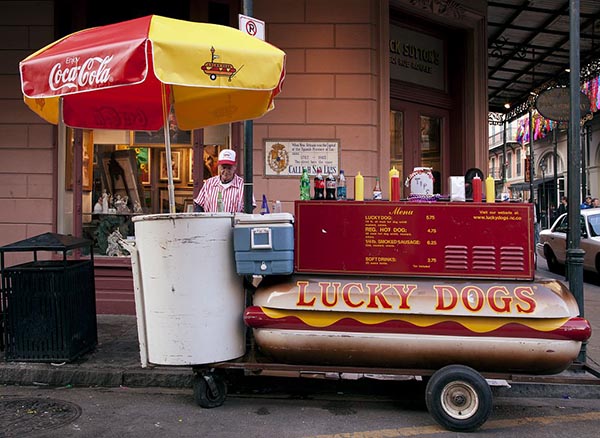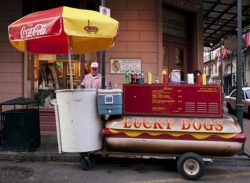Lucky Dogs
The wiener-shaped Lucky Dog hot dog pushcarts in New Orleans’s French Quarter were the inspiration for the fictional Paradise Vendors in John Kennedy Toole's novel “A Confederacy of Dunces.”

Courtesy of Library of Congress Prints and Photographs Division.
Lucky Dog vendors are the only street cart operators allowed to sell in the French Quarter.
Lucky Dogs are an iconic brand of hot dogs sold by New Orleans street vendors out of seven-foot-long steel pushcarts shaped like a giant wiener cradled in a bun. Well known to locals and tourists alike, Lucky Dogs have been a fast-food option in the French Quarter since the late 1940s. The frankfurters are also celebrated for their connection to literary history: John Kennedy Toole used Lucky Dogs as his inspiration for Paradise Vendors, Inc., one of the employers of Ignatius J. Reilly in the novel A Confederacy of Dunces, published in 1980.
A Fixture in the French Quarter
The Lucky Dogs Company was founded in 1948 by New Orleans brothers Joe and Steve Loyacano. By 1970 Steve was tired of the business—partly because of Joe’s recent death and partly because changes in the New Orleans food sanitation code required that hot dogs be pre-cooked in the warehouse rather than steamed on the cart. The quality of the product declined as a result. Steve sold the company to Doug Talbot, the former co-owner of an Orange Julius franchise in the French Quarter, and Peter Briant. The pair negotiated a redesign of the Lucky Dogs carts that met the approval of city sanitarians, and freshly steamed hot dogs regained their popularity. Briant eventually sold his interest in Lucky Dogs, and today the business is owned by the Talbot family.
Some of the early Lucky Dogs carts were motorcycles with modified sidecars that functioned as service counters. Today all the carts are pushcarts. The cart design is patented, and it was updated in the early 1980s prior to the expected tourist influx from the 1984 World’s Fair in New Orleans. The carts are manufactured by Custom Fabrication in Kenner and feature a sneeze guard, a cooled meat compartment, and four sinks. The vats of hot dogs and chili toppings are kept warm with butane heaters.
The Weiners
Lucky Dogs are all-beef wieners made by the Lykes Company in a size that is not available in supermarkets. This prevents vendors from buying their own hot dogs and hiding the sales from their bosses at Lucky Dogs. Vendors work for a 15 percent commission, plus tips.
According to Lucky Dogs manager Jerry Strahan, who titled his 1999 memoir Managing Ignatius: The Lunacy of Lucky Dogs and Life in the Quarter, if a vendor’s cash box is short at the end of his or her shift (as Ignatius Reilly’s often was) the problem is more likely to stem from overdrinking than from overeating. Vendors have been known to ditch their carts in alleys and spend their profits at the nearest bar, or to use the money to take a spontaneous trip out of town. Lucky Dogs vendors can be arrested and charged with “failure to pay a food bill” if they do not turn in their proceeds. A Lucky Dogs manager makes supply runs and cash pickups throughout each shift, and special arrangements are made to transport cash during busy times, such as Mardi Gras.
The sight of giant wieners being pushed through downtown traffic by Lucky Dogs vendors wearing their company-issued red-and-white striped shirts is part of the rhythm of life in New Orleans. The exodus of carts from Lucky Dogs headquarters at 617 Gravier Street to the French Quarter signals the beginning of another night of tourist-based commerce. When the company was founded, the cart garage was located at 1307 St. Charles Avenue, but it moved to 211 Decatur Street in the 1970s. Some of the most outrageous stories in Strahan’s memoir stem from this Decatur Street refuge of eccentric Lucky Dogs vendors and their interactions with the wild possibilities of the French Quarter just outside their door. Its headquarters are now located at 517 Gravier Street.
Memorialized in Literature
In Toole’s Pulitzer Prize–winning comic novel A Confederacy of Dunces, Ignatius Reilly is a slovenly, elephantine, 30-year-old man who lives with his widowed mother on Constantinople Street in uptown New Orleans. He prefers to spend his days playing his lute and pontificating about metaphysics and the decline of American morals, but his indolent routine is destroyed when his mother forces him to get a job. One day, after failing as an office worker, he wanders into Paradise Vendors and eats four hot dogs he cannot pay for. Threatened with arrest, he agrees to push a Paradise hot dog cart to work off his debt.
Mrs. Reilly is appalled that her son is a “weenie man” working out on the streets “like a bum.” To Ignatius, his mother’s dismay gives the job a certain appeal. He likes being away from the direct supervision of a boss and enjoys wearing his uniform white smock because it “flows freely around the human form” like an academic gown. When his boss demands that he wear a red sateen pirate’s scarf and a novelty earring while working near Pirate’s Alley, Ignatius thinks he “appears fetching in a rather dramatic way,” but his mother laments that he’s “dressed like a Mardi Gras” and makes plans to have him committed to the mental ward at Charity Hospital.
In truth, Lucky Dogs vendors do not wear costumes, but there has never been any doubt about the connection between the fiction of Paradise hot dogs and the reality of Lucky Dogs. The link between Lucky Dogs and Paradise Vending is further strengthened by a quirk of New Orleans zoning. By law, the only hot dog carts permitted to operate in the French Quarter are those owned by Lucky Dogs. This law was upheld by the US Supreme Court in 1976 in the case New Orleans v. Dukes. Nancy Dukes was the co-owner of Louisiana Concessions, a company that sold snacks and drinks from a homemade vending cart in the Quarter. In 1972, in an attempt to maintain the historic character of the neighborhood, the city decreed that only businesses that had been operating in the Quarter since 1964 could sell food from carts in the area. The only two food vendors that met this qualification were Lucky Dogs and an ice cream seller named Oliver Roberts. Dukes argued unsuccessfully that the ordinance created a monopoly and violated her rights under the Fourteenth Amendment.
